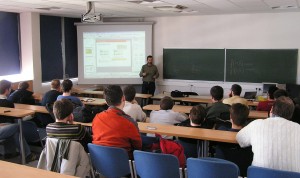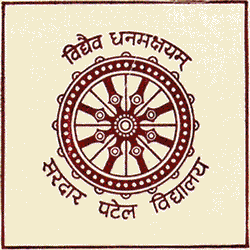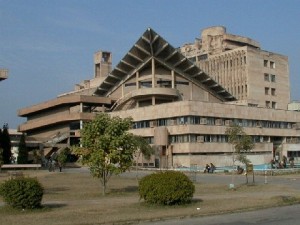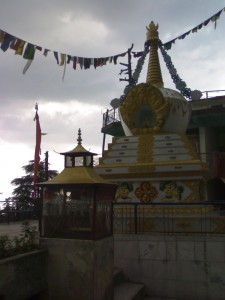A place to go, somewhere to be, I choose the way that’s right for me.
Others help, their hands are good, But they can’t help more than they should.
If others say who I should be, Then where is my identity?
God teaches me each step to take. Don’t block my path, my life’s at stake
 These lines by Tim Kolb aptly capture the relevance of informed choices in a student’s career.
These lines by Tim Kolb aptly capture the relevance of informed choices in a student’s career.
We make so many choices all the time in our careers, and some of them are big enough to actually govern who do we grow up to be; choice of subjects in class XI, choice of course/ college after 12th, choice of course to take for post graduation (or even choice not to do post graduate degree!) and also choice of jobs/ sector etc.
But how many of the choices that we make are actually informed choices? How many decisions do we take being fully aware of the consequences of not only our chosen path but also of the other paths?
During my time at IIT most of the students that I met had never given a second thought about becoming an engineer, or even about taking up science at class XI, it just seemed the obvious option that a student of their caliber was expected to do. But then that is where the problem begins, students would always contemplate what if they would have actually given it a thought in class XI, would they still have chosen the same path? And surprisingly this continues, at campus placement they again take up jobs that students of their caliber are eligible for and then they contemplate few weeks into the job whether they would have actually liked some other job better.
The problem with not having an informed choice is not that you would make the wrong choice, but the fact that you would never know if you made the right choice.
 One of the main reasons for continued traditional decision making is the social pressure and limited acceptance offered by society to people who choose to tread on their own paths. The society offers its acceptance strictly by a set of hierarchal perceptions. Even within engineering the stream selection is by norm in the order of computer science-electronics-etc etc ….. a student who is currently elated from his good performance in the entrance exams is offered advice by all the nearby relatives/ friends and friends of relatives on what branch he should choose, and the student who is clueless about what does each branch has to offer is forced to make the biggest decision of his career merely on the basis of public poll!
One of the main reasons for continued traditional decision making is the social pressure and limited acceptance offered by society to people who choose to tread on their own paths. The society offers its acceptance strictly by a set of hierarchal perceptions. Even within engineering the stream selection is by norm in the order of computer science-electronics-etc etc ….. a student who is currently elated from his good performance in the entrance exams is offered advice by all the nearby relatives/ friends and friends of relatives on what branch he should choose, and the student who is clueless about what does each branch has to offer is forced to make the biggest decision of his career merely on the basis of public poll!
Secondly, students are being asked to make choices again and again without being properly educated about the various options. There is little guidance that is provided to students in a regular manner through the education system about various possibilities that lie in front of him.
 Informed choices define the interest of student in teaching and the overall flow of education system that follows after the choice. In INSA, France, after school students are admitted into engineering institutes but are not offered specialized branches at this stage. The first year is dedicated to provide general awareness about engineering and provide students with adequate understanding so that they are able to distinguish offerings of one branch from the other. It is only in their second year that they are offered specialized branches based upon their performance in the first year. As a result the students are really passionate about what they are learning and almost all of them graduate to join core engineering services or research, because this is what they chose. Also another interesting observation in this system is that the ‘hottest branch’ keeps changing very dramatically each year, the batch I was studying with had civil engineering as the most sought after discipline, and it was biotechnology the year before. Long internships, and a 5 year degree ensures that students have a good knowledge of the work life before they actually jump into it, and can actually choose the field they want to enter.
Informed choices define the interest of student in teaching and the overall flow of education system that follows after the choice. In INSA, France, after school students are admitted into engineering institutes but are not offered specialized branches at this stage. The first year is dedicated to provide general awareness about engineering and provide students with adequate understanding so that they are able to distinguish offerings of one branch from the other. It is only in their second year that they are offered specialized branches based upon their performance in the first year. As a result the students are really passionate about what they are learning and almost all of them graduate to join core engineering services or research, because this is what they chose. Also another interesting observation in this system is that the ‘hottest branch’ keeps changing very dramatically each year, the batch I was studying with had civil engineering as the most sought after discipline, and it was biotechnology the year before. Long internships, and a 5 year degree ensures that students have a good knowledge of the work life before they actually jump into it, and can actually choose the field they want to enter.
Most importantly making informed choices lets you to take control of your life, rather than vice-versa. It instills an unmatched confidence and lets you live life without any regrets (or maybe lesser regrets!) or ‘what if’ contemplations.
July 2009
 My first tryst with a system of any kind was at ‘Sardar Patel Vidyalaya’ where I spent 14 years, from my nursery years to finally complete my Senior secondary (or 12th boards as popularly called !!).
My first tryst with a system of any kind was at ‘Sardar Patel Vidyalaya’ where I spent 14 years, from my nursery years to finally complete my Senior secondary (or 12th boards as popularly called !!).
I enjoyed school, and recall many instances, mostly small, that shaped my learning and have left a distinct mark on the way I perceive things. But it wasn’t until I actually left the school that I realized how cherished the system at my school was, all the procedures and methodologies which I had taken for granted, now seemed like innovations. Sardar Patel Vidyalaya, named after the legendary freedom fighter Sardar Vallabh Bhai Patel, also known as the Iron Man of India, was run by Gujarat Education Society and was based on the principles of free thinking and equitable distribution of opportunities. School encouraged each student to participate in each activity and test his capability in all areas ranging from art, sports, public speaking etc.
It is this idea that I really feel needs to be extended to all education systems across levels: providing students with enough exposure so as to enable them to make them ‘informed choice’ in future. I realize that most of the changes that I have been pursuing in the academic system somewhere draw heavily from this philosophy.
 Indian Institute of Technology Delhi, or simply IITD, was my next pit-stop. I entered my class with the lowest rank but graduated with rank 1; this was a land of opportunities. Everything was possible here, and more importantly IITD managed to instill this confidence in people that everything IS possible!! Looking back if there is one thing that I am taking back from IITD then it is the confidence that I can achieve anything that I set my heart upon. So much is going on in IITD which involves students that they are entrusted with responsibilities every now and then, and they learn to face crisis while still keeping a smile on the face.
Indian Institute of Technology Delhi, or simply IITD, was my next pit-stop. I entered my class with the lowest rank but graduated with rank 1; this was a land of opportunities. Everything was possible here, and more importantly IITD managed to instill this confidence in people that everything IS possible!! Looking back if there is one thing that I am taking back from IITD then it is the confidence that I can achieve anything that I set my heart upon. So much is going on in IITD which involves students that they are entrusted with responsibilities every now and then, and they learn to face crisis while still keeping a smile on the face.
This is not to say that everything is perfect here and it is heaven, after all it is here that I started my NGO VISVAS to reform the academic system. A lot needs to be changed, both from the end of students and administration, but for the first post I would like to concentrate on the brighter sides.
It was here at IITD that I was given an opportunity to go on a year long exchange to INSA-Lyon, France. I feel that it was a turning point in my life because not only did I matured a lot living alone and traveling across Europe for a year, but exposure to a different academic system actually broadened my awareness about the dynamics of its working and what are the alternatives for each.
Instead of classifying the whole system as ‘good’ or ‘bad’, it had enabled me to breakdown system into pieces and analyze characteristics of each and how it fits in with others to complete the puzzle.
 After graduation, I was chosen by SPICMACAY (Society for promotion of Indian Classical Music and Culture Amongst Youth) for a Gurukul scholarship, and I spent 6 weeks in monastery of H.H. Dalai Lama. That was a window into an ecosystem which thrived totally on faith and devotion. Initially it seems that logic stops here and it is blind faith that is governing the lives, but dwelling deeper I could find threads that link it to our system and how so much could be adapted from these monasteries and our religious schools into the main stream educational institutes. I also spent some time at the Tibetan children’s village (TCV), interacting with students conducting career counseling sessions and enriching myself all along.
After graduation, I was chosen by SPICMACAY (Society for promotion of Indian Classical Music and Culture Amongst Youth) for a Gurukul scholarship, and I spent 6 weeks in monastery of H.H. Dalai Lama. That was a window into an ecosystem which thrived totally on faith and devotion. Initially it seems that logic stops here and it is blind faith that is governing the lives, but dwelling deeper I could find threads that link it to our system and how so much could be adapted from these monasteries and our religious schools into the main stream educational institutes. I also spent some time at the Tibetan children’s village (TCV), interacting with students conducting career counseling sessions and enriching myself all along.
Our education system certainly lacks faith; faith of students in their teachers, faith of teacher in the system, and faith of system in its students: we need to bring it all back!
I beong to a family of academicians, and throughout I have been in touch with academics of different universities and colleges, with my parents being professors at colleges of Delhi University, and my relatives being professors at different universities across India. Recently my sister completed her studies from Shri Ram College of Commerce, providing me an insight into the student side of the story.
Even with my NGO, V.I.S.V.A.S. I have had an opportunity to interact with many students, teachers and principals of different colleges of Delhi University. We have been involved with activities and product implementation to solve problems of these colleges.
Armed with these experiences I decided to start putting on record my thoughts on education system as prevalent in India, and as we would like it to be. The main purpose of placing my thoughts here is to invite other perspectives and together look at each piece of this puzzle from different angles.
 These lines by Tim Kolb aptly capture the relevance of informed choices in a student’s career.
These lines by Tim Kolb aptly capture the relevance of informed choices in a student’s career. One of the main reasons for continued traditional decision making is the social pressure and limited acceptance offered by society to people who choose to tread on their own paths. The society offers its acceptance strictly by a set of hierarchal perceptions. Even within engineering the stream selection is by norm in the order of computer science-electronics-etc etc ….. a student who is currently elated from his good performance in the entrance exams is offered advice by all the nearby relatives/ friends and friends of relatives on what branch he should choose, and the student who is clueless about what does each branch has to offer is forced to make the biggest decision of his career merely on the basis of public poll!
One of the main reasons for continued traditional decision making is the social pressure and limited acceptance offered by society to people who choose to tread on their own paths. The society offers its acceptance strictly by a set of hierarchal perceptions. Even within engineering the stream selection is by norm in the order of computer science-electronics-etc etc ….. a student who is currently elated from his good performance in the entrance exams is offered advice by all the nearby relatives/ friends and friends of relatives on what branch he should choose, and the student who is clueless about what does each branch has to offer is forced to make the biggest decision of his career merely on the basis of public poll! Informed choices define the interest of student in teaching and the overall flow of education system that follows after the choice. In INSA, France, after school students are admitted into engineering institutes but are not offered specialized branches at this stage. The first year is dedicated to provide general awareness about engineering and provide students with adequate understanding so that they are able to distinguish offerings of one branch from the other. It is only in their second year that they are offered specialized branches based upon their performance in the first year. As a result the students are really passionate about what they are learning and almost all of them graduate to join core engineering services or research, because this is what they chose. Also another interesting observation in this system is that the ‘hottest branch’ keeps changing very dramatically each year, the batch I was studying with had civil engineering as the most sought after discipline, and it was biotechnology the year before. Long internships, and a 5 year degree ensures that students have a good knowledge of the work life before they actually jump into it, and can actually choose the field they want to enter.
Informed choices define the interest of student in teaching and the overall flow of education system that follows after the choice. In INSA, France, after school students are admitted into engineering institutes but are not offered specialized branches at this stage. The first year is dedicated to provide general awareness about engineering and provide students with adequate understanding so that they are able to distinguish offerings of one branch from the other. It is only in their second year that they are offered specialized branches based upon their performance in the first year. As a result the students are really passionate about what they are learning and almost all of them graduate to join core engineering services or research, because this is what they chose. Also another interesting observation in this system is that the ‘hottest branch’ keeps changing very dramatically each year, the batch I was studying with had civil engineering as the most sought after discipline, and it was biotechnology the year before. Long internships, and a 5 year degree ensures that students have a good knowledge of the work life before they actually jump into it, and can actually choose the field they want to enter. My first tryst with a system of any kind was at ‘Sardar Patel Vidyalaya’ where I spent 14 years, from my nursery years to finally complete my Senior secondary (or 12th boards as popularly called !!).
My first tryst with a system of any kind was at ‘Sardar Patel Vidyalaya’ where I spent 14 years, from my nursery years to finally complete my Senior secondary (or 12th boards as popularly called !!). Indian Institute of Technology Delhi, or simply IITD, was my next pit-stop. I entered my class with the lowest rank but graduated with rank 1; this was a land of opportunities. Everything was possible here, and more importantly IITD managed to instill this confidence in people that everything IS possible!! Looking back if there is one thing that I am taking back from IITD then it is the confidence that I can achieve anything that I set my heart upon. So much is going on in IITD which involves students that they are entrusted with responsibilities every now and then, and they learn to face crisis while still keeping a smile on the face.
Indian Institute of Technology Delhi, or simply IITD, was my next pit-stop. I entered my class with the lowest rank but graduated with rank 1; this was a land of opportunities. Everything was possible here, and more importantly IITD managed to instill this confidence in people that everything IS possible!! Looking back if there is one thing that I am taking back from IITD then it is the confidence that I can achieve anything that I set my heart upon. So much is going on in IITD which involves students that they are entrusted with responsibilities every now and then, and they learn to face crisis while still keeping a smile on the face. After graduation, I was chosen by SPICMACAY (Society for promotion of Indian Classical Music and Culture Amongst Youth) for a Gurukul scholarship, and I spent 6 weeks in monastery of H.H. Dalai Lama. That was a window into an ecosystem which thrived totally on faith and devotion. Initially it seems that logic stops here and it is blind faith that is governing the lives, but dwelling deeper I could find threads that link it to our system and how so much could be adapted from these monasteries and our religious schools into the main stream educational institutes. I also spent some time at the Tibetan children’s village (TCV), interacting with students conducting career counseling sessions and enriching myself all along.
After graduation, I was chosen by SPICMACAY (Society for promotion of Indian Classical Music and Culture Amongst Youth) for a Gurukul scholarship, and I spent 6 weeks in monastery of H.H. Dalai Lama. That was a window into an ecosystem which thrived totally on faith and devotion. Initially it seems that logic stops here and it is blind faith that is governing the lives, but dwelling deeper I could find threads that link it to our system and how so much could be adapted from these monasteries and our religious schools into the main stream educational institutes. I also spent some time at the Tibetan children’s village (TCV), interacting with students conducting career counseling sessions and enriching myself all along.